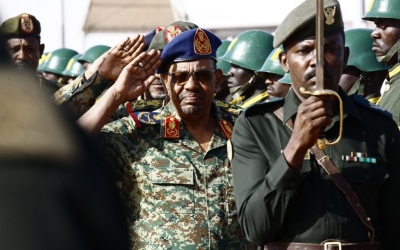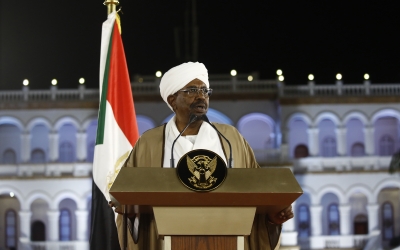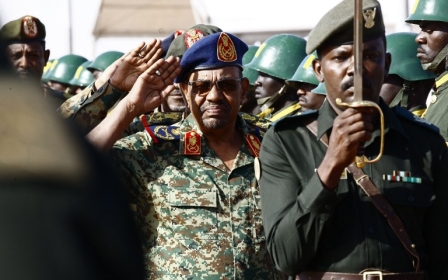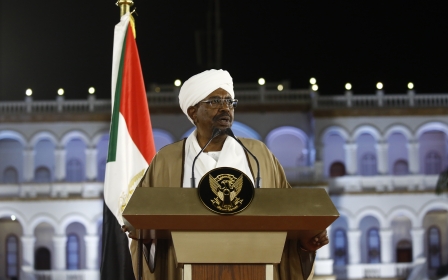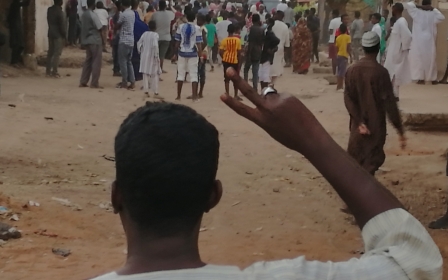Sudan protesters rally against state of emergency as new PM, governors are sworn in
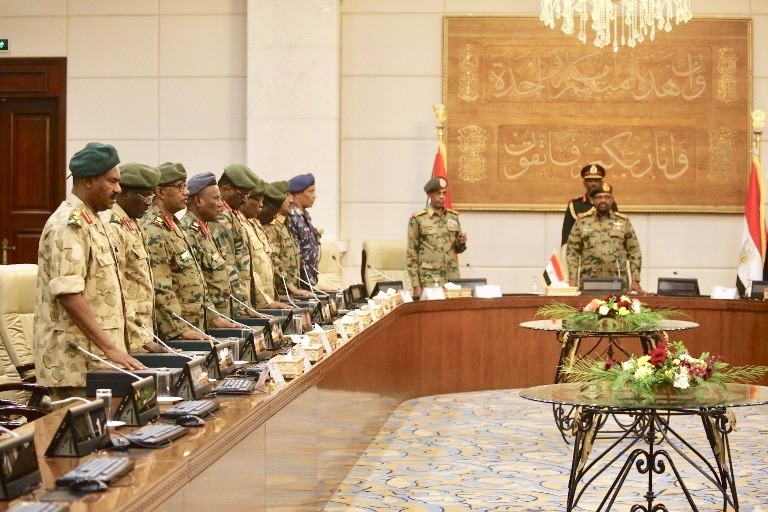
Hundreds of protesters rallied on Sunday against Sudanese President Omar al-Bashir's decision to impose a nationwide state of emergency, as the longtime leader swore in a new prime minister and military officers as regional governors.
Bashir declared a year-long emergency on Friday after a deadly crackdown failed to suppress weeks of protests that have rocked his three-decade rule, AFP reported.
The president, who swept to power in a coup in 1989, also dissolved the cabinet and provincial governments and pledged to bring in technocrats to help end the economic crisis - the key factor behind the protests.
"Firm economic measures should be taken in a new government," Bashir said, as quoted by the National on its website. "I extend a sincere invitation to the opposition forces, who are still outside the path of national reconciliation, to move forward and engage in the dialogue regarding the current issues of our country."
Still, demonstrators rallied on Sunday against his latest measures and confronted riot police in the capital Khartoum, its twin city of Omdurman and in the town of Madani, witnesses said.
Some analysts say the state of emergency is an act of desperation in the face of public anger, and a more violent confrontation between security forces and protesters cannot be ruled out.
Political analyst Abdullah Rizig told MEE on Saturday that the emergency underlines the crisis Bashir's government faces and that the president intends to use the new powers to forcefully repress the nationwide protest movement.
He compared Bashir's decision to the last-ditch attempts made by Egypt's Hosni Mubarak to save his presidency during the Arab Spring protests in 2011.
"We want to give the president a message that the state of emergency will not deter us," said Sawsan Bashir, who participated in the Omdurman rally. "Our aim is to overthrow this regime and we will do it."
Onlookers reported thick smoke billowing into the sky in Burri, with protesters setting tree trunks and tyres ablaze and blocking roads with rocks.
About 300 people rallied in al-Mamura, an upmarket area of businessmen and traders, witnesses said.
Riot police in Khartoum and Omdurman responded with tear gas, witnesses said.
Hundreds of protesters also gathered in Madani, southeast of the capital, where they were confronted with tear gas, witnesses told AFP by telephone.
Even as protests continued, Bashir swore in a new premier, vice president and governors for the country's 18 provinces on Sunday.
Former governor of the agricultural state of Jazeera, Mohamed Tahir Eila, was sworn in as the new prime minister at a ceremony in the presidential palace.
"We hope we can offer job opportunities to our youths so that they can achieve their aspirations," Eila told reporters after he was sworn in.
Bashir also appointed Mustafa Youssef to replace Moatazz Moussa as finance minister on Sunday, a presidential statement said, as reported by Reuters.
Sudan's defence minister, General Awad Ibnouf, took on the additional role of first vice president, after his predecessor Bakri Hassan Saleh was sacked by Bashir.
Sixteen army officers and two officers from the National Intelligence and Security Service dressed in military uniforms were also sworn in as governors for the country's 18 provinces.
"Today, a new chapter begins in Sudan's history," Bashir, dressed in a military uniform, said at the ceremony.
"This chapter needs special people like you to lead... in order to guarantee security and stability in the country."
The use of military garb sent a message that "the military authority is the one to assume the reins of power in a nationalistic way in the country," Fath Alrahman Ahmed, a political science professor at Neelain University, told Reuters.
Bashir is expected to announce a new cabinet as he pushes on with sweeping top-level changes.
Protest organisers have vowed to continue with daily rallies, accusing Bashir and his officials of mismanaging the economy.
Deadly clashes between protesters and security forces have left 31 people dead since protests started on 19 December, officials say.
Human Rights Watch says at least 51 people have been killed, including medics and children.
Demonstrations initially erupted in the town of Atbara after a government decision to triple the price of bread, before escalating into protests against Bashir's iron-fisted rule.
Bashir has acknowledged that the majority of the protesters were young men and women who want better economic conditions.
Sudan's financial woes have worsened amid a shortage of foreign currency since South Sudan became independent in 2011, taking with it the bulk of oil earnings.
The resulting shortages in basic goods have fuelled spiralling inflation that has devastated the purchasing power and living standards of ordinary Sudanese, from agricultural labourers to middle-class professionals.
Middle East Eye propose une couverture et une analyse indépendantes et incomparables du Moyen-Orient, de l’Afrique du Nord et d’autres régions du monde. Pour en savoir plus sur la reprise de ce contenu et les frais qui s’appliquent, veuillez remplir ce formulaire [en anglais]. Pour en savoir plus sur MEE, cliquez ici [en anglais].


